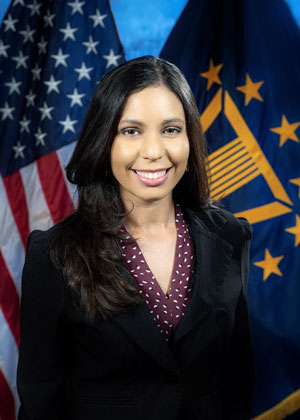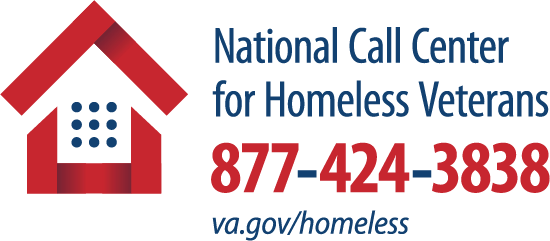Attention A T users. To access the menus on this page please perform the following steps.
1. Please switch auto forms mode to off.
2. Hit enter to expand a main menu option (Health, Benefits, etc).
3. To enter and activate the submenu links, hit the down arrow.
You will now be able to tab or arrow up or down through the submenu options to access/activate the submenu links.
Locator
Contact
Search
VA »
VA Homeless Programs
»
Message from Monica Diaz, Executive Director, VHA Homeless Programs Office
VA Homeless Programs
Message from Monica Diaz, Executive Director, VHA Homeless Programs Office
February 2022

Although the Winter Olympics commenced in Beijing this month, the gold medal ceremony I am most excited to watch will take place in Washington, DC. The recipients? The surviving members of the 6888th Central Postal Directory Battalion—the “Six Triple Eight” for short. As the only unit comprised entirely of Black women in World War II, the Six Triple Eight overcame all odds to ensure American troops on the front line received letters from loved ones at home. The Battalion’s motto, “No Mail, Low Morale,” encapsulated the critical role mail played in maintaining the spirit of service members.
In February 1945, Six Triple Eight arrived in England to their post, full of post (17 million pieces to be exact)! 99-year-old Lena King is 1 of just 6 living members of this iconic battalion; in a recent TODAY Show interview, she described the unit’s motivation: “We wanted to show proof that we loved our country, even if they didn’t love us back all the time.” Though the women answered Uncle Sam’s call voluntarily, their homecoming was defined by a much uglier American personification: Jim Crow.
77 years after their service, the U.S. House of Representatives will vote on joining their Senate counterparts in supporting awarding the Congressional Gold Medal to the Six Triple Eight this month. Celebrating these heroic women is long overdue—the delay is an uncomfortable reminder that too often, the contributions of black Americans to our nation have been overlooked. This Black History Month, VA is hoping to help change this pattern by telling the stories of the brave Black men and women who have served our nation in our Black History Month VAntage Point series. I urge each of you to read these amazing stories, as they feature some of the finest examples of character and courage our nation has ever seen.
We cannot simply reflect on the past to celebrate Black history—we must ensure we are doing everything we can to support Black Veterans today. It is well-documented that over the life course, systematic racism influences nearly every aspect of health outcomes, including increasing the frequency of risk factors that may lead an individual to experience homelessness. Data from 2018 reveals that in every state, Black Americans were more likely than their white counterparts to experience homelessness. Data from this year’s PIT Count included the U.S. Department of Housing and Urban Development’s 2021 Annual Homeless Assessment Report to Congress, revealing an overrepresentation in Black Americans among the sheltered homeless Veteran population. While 12% of Veterans are Black or African American, this population comprised over 1/3 of the sheltered homeless population in 2021.
Alongside our partners, HPO has been working tirelessly throughout the pandemic to reduce such disparities by addressing the unique risk factors Black Americans face. Fortunately, we just received a promising indicator that our efforts are on the right track: there was a 10% decrease in the number of Veterans experiencing sheltered homelessness in the U.S. in 2021, and a 12% overall decrease in the number of Black Americans experiencing sheltered homelessness. Thanks to the unwavering efforts of the VHA Homeless Programs team and our committed partners, this is the largest one-year decline in Veteran sheltered homelessness observed since 2015-2016! Such data is a reminder that by working together in times of great challenges, we can achieve great change.
The small percentage of Six Triple Eight Veterans among us today is a stark reminder that time passes quickly, and our Veteran population is growing older. The average age of Veterans using VHA Homeless Programs services is 62 years old, with nearly half of recipients between 60-90 years of age. Our systems must adapt to the urgent needs of older Veterans, who are experiencing homelessness at unprecedented rates. In the time of COVID, it is especially urgent that we work together to prevent homelessness and protect the health of these particularly vulnerable Veterans.
I would like to highlight a few of the resources VA offers to older Veterans; awareness of these services is critical, as connecting older Veterans to the correct support can help prevent homelessness. VA’s Geriatrics and Extended Care Program may be able to help the older Veterans you know or serve by providing a range of services, including those focused on Home and Community Services, Residential Settings and Nursing Homes, Mental Health, Memory Loss and Brain Health, and Health, Fitness, and Rehabilitation.
As February is American Heart Month, it is critical that we both acknowledge the increased risk of heart disease among our aging Veterans, as well as leverage the aforementioned services to help protect the hearts of those we love. I encourage everyone to have a conversation about your risk factors for heart disease this month and continue to learn about heart disease prevention by reading about VA’s groundbreaking research in this field over the past few decades.
While not frequently mentioned by scientists, Valentine’s Day reminds us of another protective factor for our health: love. I am positive that the most powerful tool we each possess to end homelessness is love—love of service, giving, and improving the lives of our Veterans. Lead guitarist of The Beatles, George Harrison, once said, “With our love, we could save the world.” If Harrison saw the love demonstrated by the VHA Homeless Programs and our partners every day and learned of the progress we have made this year in preventing homelessness, he would know just how true his words are today.
Make the Call
Dial 1-877-4AID-VET
(1-877-424-3838)
Access VA’s services for homeless and at-risk Veterans, available 24/7.
Chat Online
VA Medical Center
(VAMC) Locator
Locate Your Local
VA Medical Center Now
Veterans who are homeless or at risk of homelessness can call or visit their local VA Medical Center (VAMC) and ask for a Homeless Coordinator. Use the VA locator tool www.va.gov/directory to find your nearest VAMC and call or visit today.





























